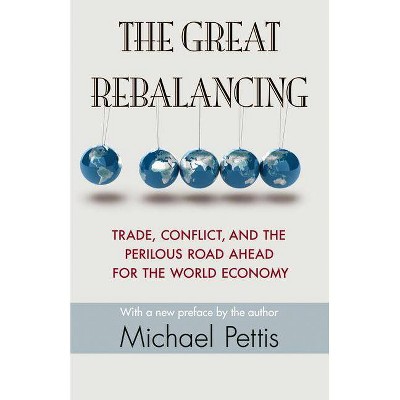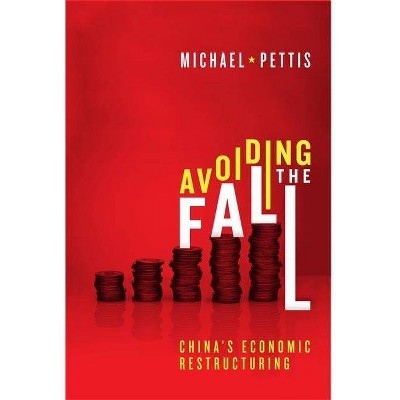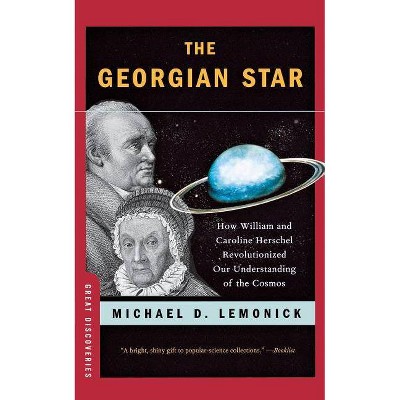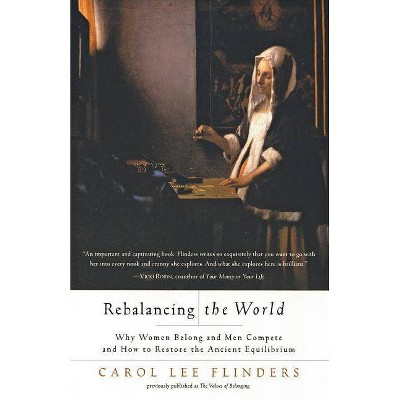The Great Rebalancing - by Michael Pettis (Paperback)

Similar Products
Products of same category from the store
AllProduct info
<p/><br></br><p><b> Book Synopsis </b></p></br></br><p><b>How trade imbalances spurred on the global financial crisis and why we aren't out of trouble yet</b> <p/>China's economic growth is sputtering, the Euro is under threat, and the United States is combating serious trade disadvantages. Another Great Depression? Not quite. Noted economist and China expert Michael Pettis argues instead that we are undergoing a critical rebalancing of the world economies. Debunking popular misconceptions, Pettis shows that severe trade imbalances spurred on the recent financial crisis and were the result of unfortunate policies that distorted the savings and consumption patterns of certain nations. Pettis examines the reasons behind these destabilizing policies, and he predicts severe economic dislocations that will have long-lasting effects. <p/>Demonstrating how economic policies can carry negative repercussions the world over, <i>The Great Rebalancing</i> sheds urgent light on our globally linked economic future.</p><p/><br></br><p><b> From the Back Cover </b></p></br></br><p>"Through the past decade of China's financial and strategic emergence, Michael Pettis has been a source of unfailing common sense about the possibilities and limitations of the Chinese model. Now he has put his analysis and recommendations into one concise book. I highly recommend reading and reconsulting his book to put the daily flow of China news into perspective."<b>--James Fallows, author of <i>China Airborne</i></b></p><p>"This is a brilliant book, one that absolutely must be read by all who are concerned with globalization's future. Michael Pettis debunks the reigning conventional wisdom about international trade, finance, and globalization, and provides the most clear-eyed, unbiased, and unvarnished insights into how the Chinese economy works. From Chinese savers to Greek debtors to American bankers, Pettis shows how we are all connected--and what to prepare for on the road ahead."<b>--Clyde Prestowitz, author of <i>The Betrayal of American Prosperity</i></b></p><p>"Michael Pettis has written an essential guide to the macroeconomic imbalances that bedevil today's global economy. We ignore his message at our peril."<b>--Dani Rodrik, author of T<i>he Globalization Paradox</i></b></p><p>"This is a profoundly interesting exploration of the causes of the trade and capital imbalances that produced the 2008 financial crisis. Michael Pettis argues that the structural gap between China's domestic consumption and production is the central reason for its pursuit of export-led growth through currency undervaluation. His analysis focuses valuable attention on the deep domestic reforms required in all the major trading countries for the 'great rebalancing' of their international accounts--and the avoidance of continuing crises."<b>--Robert Skidelsky, author of <i>Keynes: The Return of the Master</i></b></p><p/><br></br><p><b> Review Quotes </b></p></br></br><br>Pettis does a major service in explaining the determinants of global imbalances, providing insights into the functioning of the Chinese economy, while bringing in quotes from historical figures, prominent economists, and misguided pundits. This serves the purpose of underscoring how confused thinking can be on this important topic--a topic that ultimately helps determine the distribution of growth and jobs around the globe. I hope this book stimulates a more informed debate on how to rebalance growth, trade, and capital flows in the least disruptive manner.<b>---Caroline Freund, <i>Journal of World Trade</i></b><br><br>With much pleasure, I highly recommend Michael Pettis' newest book <i>The Great Rebalancing</i>. . . . Michael Pettis has taught me most of what I know about global trade. I also happen to believe he is the world's foremost expert on China in relation to trade and global macro events. I give two thumbs up to <i>The Great Rebalancing</i>.<b>---Mike "Mish" Shedlock, <i>Global Economic Analysis</i></b><br><br><i>The Great Rebalancing</i> does what all good books should do: it prompts the reader to question old assumptions and think about the world in a slightly different way. That is not only intellectually stimulating; it is, or should be, also of practical value. Maybe one day they will even get around to reading, and learning from, this book in Berlin.<b>---Guy de Jonquiéres, <i>Economic Record</i></b><br><br><i>The Great Rebalancing</i> is probably one of the clearest, most elegant and logically written explanations of world trade, including both how policies affect trade and how trade affects economies. . . . [T]his is not just a China book, but a book encompassing some of the biggest economic and financial questions of our time. The persuasive, clear and well-reasoned arguments behind many of the seemingly unorthodox ideas in the book will make it both pleasing and nicely unsettling for many readers. Hopefully its message will be heard amongst policymakers before some of the more disturbing predictions become realities.<b>---James Parker, <i>Diplomat Pacific Money Blog</i></b><br><br><i>The Great Rebalancing</i> offers a stimulating read. The author advances many arguments I find quite interesting and pushes me to rethink issues I tend to take for granted. It certainly provides a different perspective.<b>---Paul Deng, <i>Copenhagen Journal of Asian Studies</i></b><br><br>[A] book full of easy-to-understand, yet often misunderstood theories, explanations and predictions for what went wrong internationally before the 2008 Financial Crisis, what has been going on since, and where things are likely to head in the future. . . . <i>The Great Rebalancing</i> is probably one of the clearest, most elegant and logically written explanations of world trade, including both how policies affect trade and how trade affects economies. . . . [T]his is not just a China book, but a book encompassing some of the biggest economic and financial questions of our time. The persuasive, clear and well-reasoned arguments behind many of the seemingly unorthodox ideas in the book will make it both pleasing and nicely unsettling for many readers. Hopefully its message will be heard amongst policymakers before some of the more disturbing predictions become realities.<b>---James Parker, <i>Diplomat</i></b><br><br>[Michael Pettis is] a brilliant economic thinker.<b>---Edward Chancellor, <i>Wall Street Journal</i></b><br><br>I've been waiting for this book for over 10 years. . . . Anyone who wants to understand international economics better will benefit from this book. I cannot recommend it more highly.<b>---David Merkel, <i>Seeking Alpha</i></b><br><br>This is a book that should be read by: (a) politicians, central bankers and anybody else involved in macroeconomic policy; (b) all economists; (c) all students of economics; and (d) everybody else. <i>The Great Rebalancing: Trade, Conflict and the Perilous Road Ahead for the World Economy</i> by Michael Pettis is as sharp and clear as a cut diamond in its analysis of the continuing global imbalances. The author brings logic, accounting identities and clarity of thought and language to bear on the issue of prospects for the global economy, putting most other commentators into the shade.<b>---Diane Coyle, <i>Enlightened Economist</i></b><br><br>This is a dense and well-argued book. . . . It will be read with interest by the large and growing community that follows China's economy.<b>---Mark O'Neill, <i>South China Morning Post</i></b><br><br>[<i>The Great Rebalancing</i>] is original and quite convincing, and coherently challenges conventional accounts.-- "Choice"<br><br>[F]ascinating reading.-- "BizEd"<br><br>Demonstrating how economic policies can carry negative repercussions the world over, <i>The Great Rebalancing</i> sheds urgent light on our globally linked economic future.-- "World Book Industry"<br><br>Insightful. . . . [O]ffers a sweeping perspective that links trade, exchange rates, and cross-border capital flows to underlying domestic taxation, investment, and fiscal policies. . . . Pettis's erudite, but lucid and very readable analysis brims with surprising ripostes to conventional wisdom. . . . Pettis's stimulating, contrarian take on the present crisis challenges dogma with clear thinking.-- "Publishers Weekly"<br><br>Policymakers should heed the macroeconomic laws that Pettis articulates. His text is a sound introduction to global balance-of-payment mechanisms, using the financial crisis as the ideal case study.-- "Survival"<br><p/><br></br><p><b> About the Author </b></p></br></br><b>Michael Pettis</b> is professor of finance and economics at Peking University, a senior associate at the Carnegie Endowment, and a widely read commentator on China, Europe, and the global economy. He is the author of <i>The Volatility Machine: Emerging Economies and the Threat of Financial Collapse</i>.
Price History
Cheapest price in the interval: 14.19 on October 22, 2021
Most expensive price in the interval: 14.19 on November 8, 2021
Price Archive shows prices from various stores, lets you see history and find the cheapest. There is no actual sale on the website. For all support, inquiry and suggestion messagescommunication@pricearchive.us



















